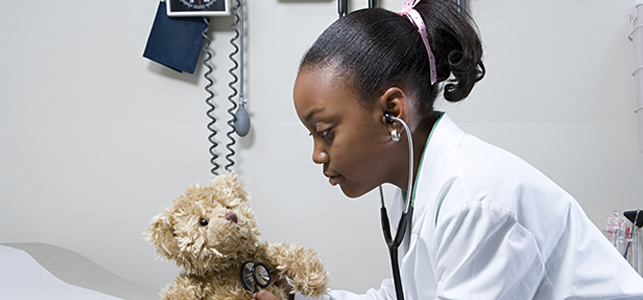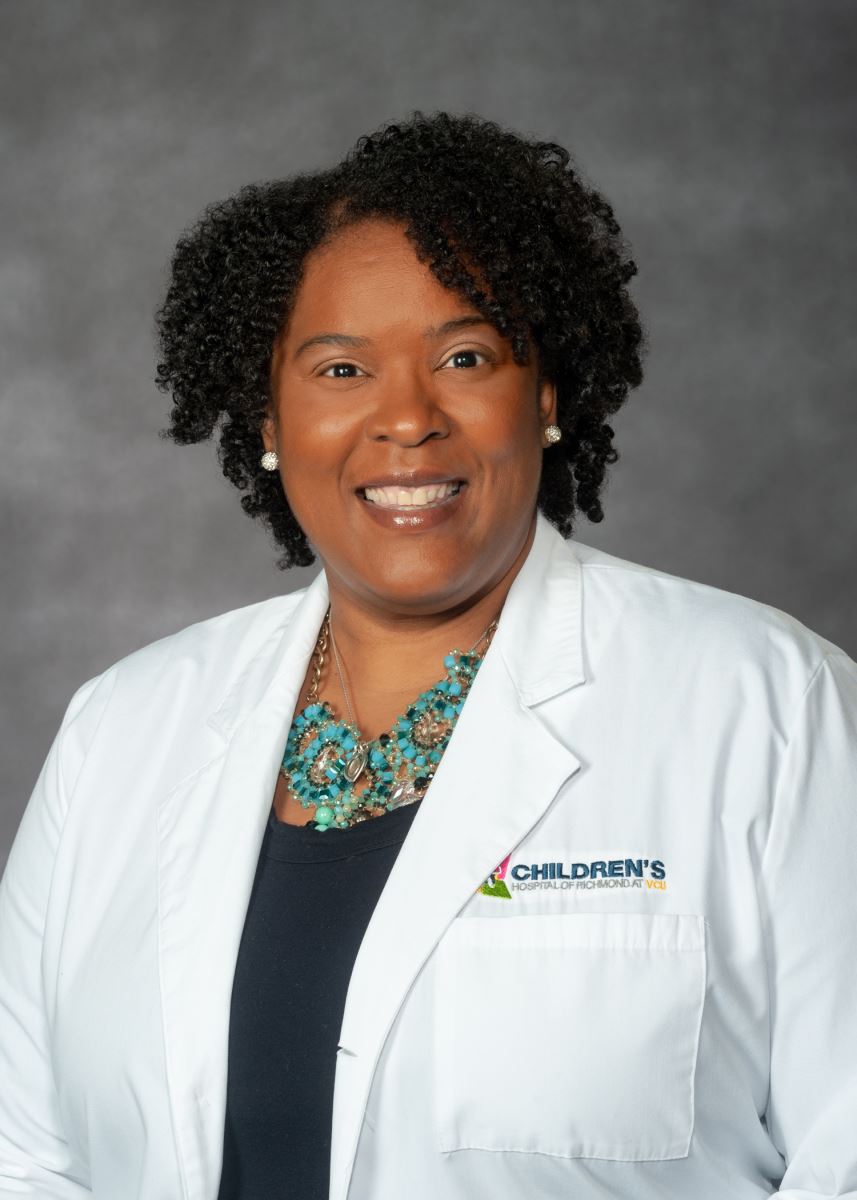Children's Emergency Department is now located in Children's Tower: 1001 E. Marshall Street.
Learn more
Dr. Stephanie Crewe, chief of the Division of Adolescent Medicine grew up in the city and was determined that expectations of her based on her zip code would not dictate her future. She shares how she forged her own path to becoming a physician and returned to her hometown following medical training to help kids in similar shoes. She also offers some advice for talking with kids about racism and breaking the cycle of racial injustice.
 I think the most basic answer to that question is to help. Really early on in life, I realized that in our most vulnerable and delicate states as human beings we need others. We require more love, empathy, understanding and encouragement and I feel like, as a physician, I'm able to help provide these things when my patients are in these vulnerable states. When they're ill, or even when they’re healthy but need guidance, I felt that the best position I could be in to help was as a physician.
I think the most basic answer to that question is to help. Really early on in life, I realized that in our most vulnerable and delicate states as human beings we need others. We require more love, empathy, understanding and encouragement and I feel like, as a physician, I'm able to help provide these things when my patients are in these vulnerable states. When they're ill, or even when they’re healthy but need guidance, I felt that the best position I could be in to help was as a physician.
The second reason, and I don't think I realized this until a little later in life, is that I genuinely wanted to prove a system wrong. I wanted that system of pre-judgment to be broken – where the public health stats said that I would be a certain statistic based on my zip code, based on where I came from, that I should not or would not achieve certain goals. I wanted to change that narrative. I was a girl from the south side of Richmond, Virginia, an inner-city kid and I really didn't have a physician to emulate. I didn't have a silver spoon or even a path to follow or blueprint to go by. So for me, it was getting out of that thought pattern of a system that places kids in a very narrow box that's filled with pessimism and surrounded by this forecast of doubt about what you could or couldn't do or achieve in life. I insisted that was not going to become my personal narrative. It actually fueled me and served as a motivating factor.
The idea first came about when I was in the fifth grade. That's when I really first heard of what a pediatrician was. I couldn't spell it, but I liked that idea of helping kids who needed help – kids like me. I can remember verbalizing that in the fifth grade and certainly by high school I was pretty set on the decision.
My aunt actually acquired breast cancer when she was very young – only 30 years old with two children. That was also an eye-opening moment and further inspired me to get involved in the medical system and make an impact for people who are going through illnesses and facing difficult diagnoses.
It was a little bit of combination. I think that in medical school you're often matched with people with similar interests but not necessarily the same backgrounds, and so you had what I believe was the diversity of reasons as to why people were pursuing their careers. Some people pursue medicine because that's the expectation culturally. Other people pursue medicine because they had that family member who was ill and they want to contribute to improving the patient experience. We all had different scenarios, but that's what made us unique, and actually that's what made us really forge ahead. Even if we didn’t all come into it working for that inner-city kid who didn't have a path, we were all on the same path now and we helped push each other forward.
I think the most rewarding part of my job is that I have the opportunity to make an impact at one of the most critical points in life. I only work with teenagers, ages 12 to 22 years, which is a transitional, transformative stage. We know that this is a point when foundational behaviors are laid, this is an opportunity for pruning their lives, this is a time for identity formation and helping them to really figure out who they are in society and what they're going to become. I can help fuel them with the resources that are needed.
Sometimes I'm the medical provider, sometimes I'm the cheerleader, sometimes I'm the counselor. Every day is a new opportunity to serve a role that's important for the lives of growing teenagers and young adults.
I would also say – going back to the initial question of why I wanted to become a physician – I'm now a model for young men and women who don't have that blueprint. They can say 'okay if she did it then I know I can do it.’ When a kid from inner-city Richmond tells me 'you don't know what my school is like’ or ‘you don't know what my neighborhood is like' – I can actually say that I do. So let's work on how we can get to what we want and how we can achieve those goals and not let a school or neighborhood be a hindrance. So I'm that reflective model and it becomes very rewarding to see what happens next.
That's a very difficult, but very important question. I look at Mr. Floyd as being the tipping point. This has been an issue that’s been buried for far too long and, as with any tipping point, there have been several events that led to this very impactful change that has to occur. I think what we all have to understand is that these witnessed injustices that have been occurring and that happened with Mr. Floyd are actually the reality that some people go through every single day, specifically racial minorities including Black and Latino families.
What advice could I possibly offer for this massive issue? I think it's threefold. First, we must each start to serve as advocates and allies. I think we’ve found that our collective voice makes a difference and it makes change when we come together, evaluate what's going on and work toward being understanding, but also physical and vocal agents of change.
I think we also have to begin to understand the emotional wounds that have been caused historically. We can't forget – this is not, Mr. Floyd died and now all of that pain comes out because of that one event. We have to start understanding and then addressing the unmet emotional and psychological needs of populations that have been significantly impacted.
I’ll also add that we have to use every single opportunity to openly and honestly have discussions about issues that target specific populations and help to develop specific strategies for improving the status quo.
Of course there's lots of advice I can offer, but I think if we use those top three as our initial agents, we can start to make headway in terms of improving the conditions that some of our populations face.
You have to be comfortable with being uncomfortable, that's the first thing. This is not something that's taught in elementary school curriculum. These are behaviors that we learn from our parents and our grandparents, and in our environments. As parents, we often think we have to know everything for our children and if at any point we show that we're uncomfortable that's a bad thing. But it's okay to be uncomfortable with having some of the toughest conversations that families have had to deal with.
Also, remember that certain populations have uncomfortable conversations every day. As a personal example, my nephew is a 17-year-old Black male. As a family, we have to teach him what an encounter might look like if a cop pulls him over. We talk about what to do in that situation and what not to do, and then we have to trust that he's going to follow those guidelines. What happens if he doesn't? That's a very uncomfortable conversation, but it's a conversation that must be had so that he knows how to deal with it. We have to learn to be comfortable in uncomfortable conversations.
The second thing I would say is that we have to be vulnerable, yet informed. There are many books that can help. Start off with children's books. Go to an elementary-based book that they sell on Google or Barnes and Noble. There is also a remarkable number of videos that are very helpful. I often refer families to a PBS video special called 'let's talk about race and racism,' which includes several different parents talking about having conversations with children. Sesame Street also has a wonderful special that can help inform how you're going to start this conversation with children. So, you may need to start basic and then expand to adult books that go into more depth about experiences that people have had, which is critical to being able to be vulnerable yet informed about race and racism.
I always say be willing to learn and be willing to listen – that would be my third bullet. We all have had life experiences but we have to be able to display empathy. Other people’s experiences may not match yours by any stretch of the imagination, but it’s important to listen, learn and find out how you can apply what you've heard to how you approach conversations with your own family or when we're using our voice collectively.
The last thing, which kind of roots all of this, is teach early. The earlier kids are introduced to concepts and behaviors, the better – what they see mom and dad do, they’re probably going to follow that same trajectory.